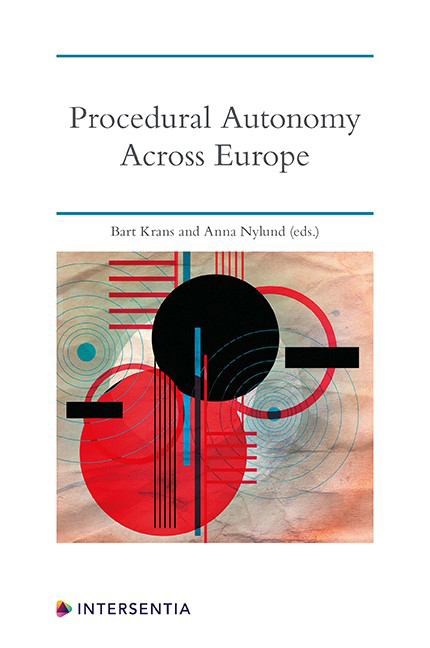Book contents
- Frontmatter
- Preface
- Contents
- Table of Cases
- List of Authors
- Aspects of Procedural Autonomy
- Procedural Autonomy and Belgian Civil Procedure Law: A Turbulent Cohabitation
- The English Approach to Procedural Autonomy
- The Finnish Way of Understanding Procedural Autonomy: A Practical Approach to Implementing EU Civil Procedural Law
- A German Perspective on the Waning Procedural Autonomy in Civil Matters: Who is Afraid of European Civil Procedure?
- Procedural Autonomy in the Netherlands: A Fading Relic?
- Procedural Autonomy, the EEA Agreement and Norwegian Law: The Art of Bridging a Gap and Maintaining it Too
- A Polish Perspective on Collective Civil Proceedings: Reluctance to Follow EU Recommendations?
- Procedural Autonomy between EU Law and the Slovenian Law of Civil Procedure
- Autonomy of the Spanish Legislator in the Regulation of Procedural Law: The Borders of European Case Law
- Procedural Autonomy in Sweden: Is Materielle Prozessleitung the Answer?
- Comparative Insights on Procedural Autonomy
- Index
- ABOUT THE EDITORS
The English Approach to Procedural Autonomy
Published online by Cambridge University Press: 30 April 2020
- Frontmatter
- Preface
- Contents
- Table of Cases
- List of Authors
- Aspects of Procedural Autonomy
- Procedural Autonomy and Belgian Civil Procedure Law: A Turbulent Cohabitation
- The English Approach to Procedural Autonomy
- The Finnish Way of Understanding Procedural Autonomy: A Practical Approach to Implementing EU Civil Procedural Law
- A German Perspective on the Waning Procedural Autonomy in Civil Matters: Who is Afraid of European Civil Procedure?
- Procedural Autonomy in the Netherlands: A Fading Relic?
- Procedural Autonomy, the EEA Agreement and Norwegian Law: The Art of Bridging a Gap and Maintaining it Too
- A Polish Perspective on Collective Civil Proceedings: Reluctance to Follow EU Recommendations?
- Procedural Autonomy between EU Law and the Slovenian Law of Civil Procedure
- Autonomy of the Spanish Legislator in the Regulation of Procedural Law: The Borders of European Case Law
- Procedural Autonomy in Sweden: Is Materielle Prozessleitung the Answer?
- Comparative Insights on Procedural Autonomy
- Index
- ABOUT THE EDITORS
Summary
This chapter considers the approach taken to civil procedural harmonisation in England and Wales (England) in the light of procedural developments from EU law. It does so in the broad context of the UK's departure from the EU. It considers two approaches to EU procedural developments by English rule-makers. First, it looks at an approach which has seen the effect of EU procedural developments minimised within English civil procedure. This is an approach that treats EU developments as lex specialis, rather than as the basis for broader reform of English procedure. Secondly, it looks at an approach which sees English rule-makers reject EU developments to the maximum extent possible. Underpinning both approaches is a general standard, which sees the English rule-maker draw on procedural developments in common law and civilian jurisdictions where they are perceived to be best practice. The extent to which EU developments have influenced the English rule-maker thus depend on the extent to which they satisfy a pragmatic best practice test. Finally, the chapter considers two possible ways in which EU procedural developments may continue to influence English civil procedure following the UK's departure from the EU.
INTRODUCTION
On 29 March 2019, the United Kingdom was scheduled to leave the EU. That date passed without departure taking place, as the United Kingdom and EU agreed an extension of time to put in place the basis on which withdrawal would take effect. The two agreed that withdrawal would take place on 31 October 2019. From that date, assuming withdrawal occurs, the influence of EU law on procedural developments in England and Wales (England) will, in one sense, alter fundamentally. While the EU may continue, as Krans and Nylund have described it, a trend towards an ‘increasing Europeanisation of civil procedure’’, England will no longer formally be part of that process. Whatever that trend may have been and whatever its interrelation with the principle of procedural autonomy, the freedom to develop civil procedure as English policymakers chose, there was in principle prior to the UK's withdrawal from the EU, it will cease to apply thereafter. There will, it is reasonable to assume, be far more room to manoeuvre for England than there was previously.
- Type
- Chapter
- Information
- Procedural Autonomy Across Europe , pp. 37 - 56Publisher: IntersentiaPrint publication year: 2020



